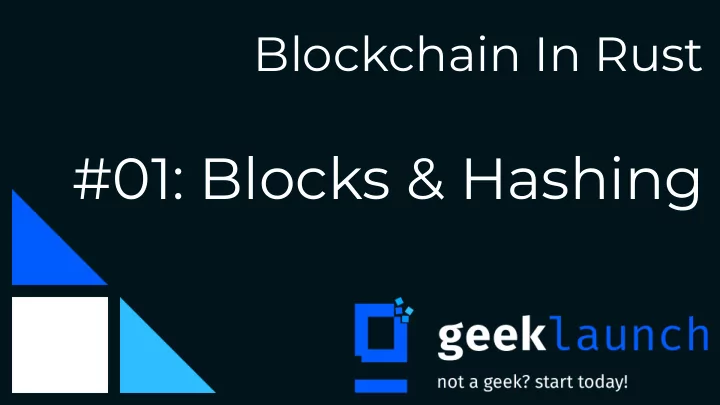

Blockchain In Rust #01: Blocks & Hashing
Before we start Download and install Rust if you want to code along: https://www.rust-lang.org/ Optionally, you may also want to install Git: https://git-scm.com/
Blockchains for Programmers
Cryptocurrency Blockchains Two main data structures The blocks in the blockchain (our sole focus in this video) ● The transactions within the blocks (future videos) ● Ancillary data Wallets ● Addresses ● Balances ● Peers ●
Generic Blockchains (with PoW support) Blockchain ≈ chronological, sequential list of blocks Blocks contain this information: Index : this block’s location within the list of blocks ● Payload : any relevant information or events that have occurred for/in the block ● Timestamp : gives our blockchain a sense of time ● Nonce : special number used for mining (for PoW verification) ● Previous block hash : cryptographic fingerprint of previous block ● Hash : cryptographic fingerprint of all of the above data concatenated together ●
Concept: Hashing
What is Hashing? In a nutshell, a hash algorithm consists of a set of irreversible computations that can be performed on a datum to generate a (usually) unique byte sequence. MD5(“GeekLaunch”) = “e76485e55ba4c16aac30bd446b73d96e” SHA-1(“GeekLaunch”) = “c333e84f729c67d6b591e056e1b51e0077a9c030” SHA-256(“GeekLaunch”) = “a17d5669f2148e2982baab7c0b4c7d81100c7cf52c45a8d7deb429aeba156ea6”
What we will be using
Rust Programming What is Rust? Rust is a systems programming language that runs blazingly fast, prevents segfaults, and guarantees thread safety. - https://www.rust-lang.org/ The Rust Programming Language (Free Book) - https://doc.rust-lang.org/book/2018-edition/index.html
Java vs. Rust Overview Java Rust Compile once, run anywhere Interoperable with C/++ ● ● Requires virtual machine (JVM) Friendly, intelligent compiler ● ● Strongly typed Simple “garbage collection” rules ● ● Classical type system “Pointers” are always safe ● ● Taught at most universities Not taught at most universities (yet) ● ● Developed by Oracle Developed by Mozilla ● ● My three words: Simple, Safe, Slow My three words: Complex, Safe, Fast Famous uses: Android Famous uses: Firefox c.f. My three words for C: Simple, Unsafe, Fast
Java Code vs. Rust Code
class Block { public int index; public long timestamp; public BlockHash prevBlockHash; public BlockHash hash; public String payload; public Block (int index, long timestamp, BlockHash prevBlockHash, String payload) { this.index = index; this.timestamp = timestamp; Java Code this.prevBlockHash = prevBlockHash; this.hash = new BlockHash(new int[] {0, 0, 0, 0, 0, 0, 0, 0, 0, 0, 0, 0, 0, 0, 0, 0}); this.payload = payload; } }
pub struct Block { pub index: u32, pub timestamp: u64, pub prev_block_hash: BlockHash, pub hash: BlockHash, pub payload: String, } impl Block { pub fn new (index: u32, timestamp: u64, prev_block_hash: [u8; 16], payload: String) -> Self { Block { Rust Code index, timestamp, prev_block_hash, hash: [0; 16], payload, } } }
class Block { constructor (index, timestamp, prevBlockHash, payload) { this.index = index; this.timestamp = timestamp; this.prevBlockHash = prevBlockHash; this.payload = payload; this.hash = Array(16).fill(0); } JS Code } But JavaScript is too high-level...
Let’s get coding!
Where to start Get the project starter code from the GitHub repository GeekLaunch/blockchain-rust on tag start-here https://github.com/GeekLaunch/blockchain-rust/tree/start-here $ git clone https://github.com/GeekLaunch/blockchain-rust.git $ git checkout start-here
Recommend
More recommend